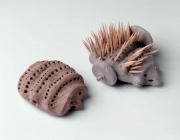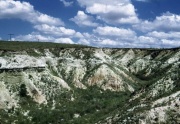Marl
Revision as of 06:37, 24 July 2013 by (username removed)
Description
A friable mixture of clay that contains a high proportion of calcium carbonate. Marls are secondary clays that often contain sand, iron oxide, and other impurities. Marls are most often used as alkaline additives to soil. As a pottery clay, marl tends to be aplastic and is often used for slipware, earthenware, and brick. Some examples of marls used in pottery are (Fournier 1996):
- Keuper marl: contains magnesium carbonate and gypsum; variable in color
- Etruria marl: contains almost no lime
- Cambridge marl: contains about 40% lime
Synonyms and Related Terms
Keuper marl; Etruria marl; Cambridge marl; calcareous clay; marga (Port.)
Additional Information
R. Fournier, Illustrated Dictionary of Practical Pottery, Chilton Book Co., Radnor, PA, 1996.
Authority
- G.S.Brady, Materials Handbook, McGraw-Hill Book Co., New York, 1971 Comment: p. 118
- Henry Hodges, Artifacts: An Introduction to Early Materials and Technology, Ronald P. Frye, Kingston, Canada, 1988
- Robert Fournier, Illustrated Dictionary of Practical Pottery, Chilton Book Company, Radnor, PA, 1992
- Random House, Webster's Encyclopedic Unabridged Dictionary of the English Language, Grammercy Book, New York, 1997
- The American Heritage Dictionary or Encarta, via Microsoft Bookshelf 98, Microsoft Corp., 1998
- Art and Architecture Thesaurus Online, http://www.getty.edu/research/tools/vocabulary/aat/, J. Paul Getty Trust, Los Angeles, 2000

